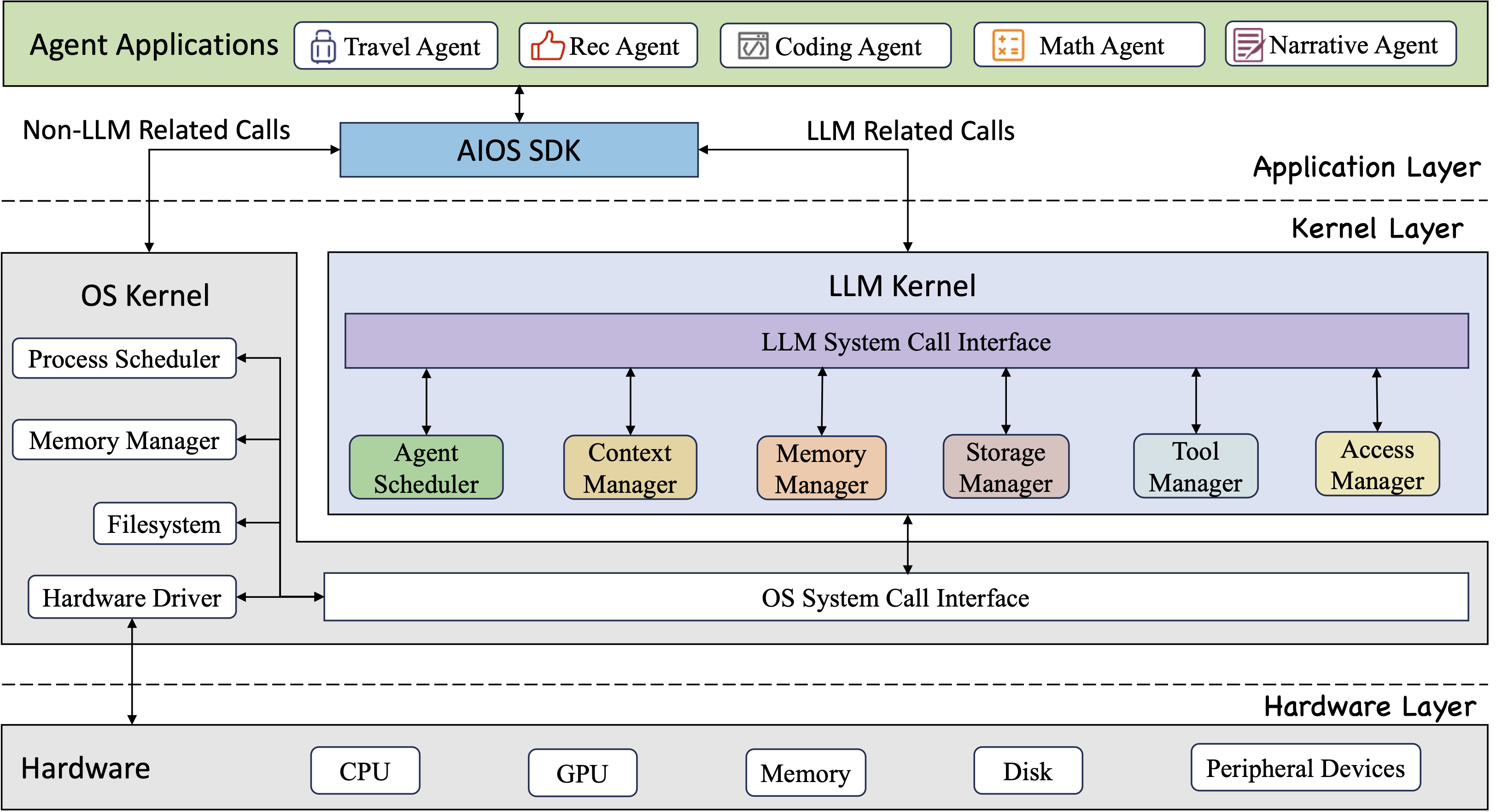AIOS, a Large Language Model (LLM) Agent operating system, embeds large language model into Operating Systems (OS) as the brain of the OS, enabling an operating system "with soul" -- an important step towards AGI. AIOS is designed to optimize resource allocation, facilitate context switch across agents, enable concurrent execution of agents, provide tool service for agents, maintain access control for agents, and provide a rich set of toolkits for LLM Agent developers.
- [2024-04-14] 🚀 AIOS currently supports generation interrupt (for open-sourced llms from huggingface) and customized console loggers. Feel free to try!
- [2024-04-05] 🛠️ AIOS codebase has been updated to add shell simulator, rapid API calls, and pre-commit test cases. Please see CONTRIBUTE for how to test your contributions and create pull requests.
- [2024-04-02] 🤝 AIOS Discord Community is up. Welcome to join the community for discussions, brainstorming, development, or just random chats!
- [2024-03-25]
✈️ Our paper AIOS: LLM Agent Operating System is released and AIOS repository is officially launched! - [2023-12-06] 📋 After several months of working, our perspective paper LLM as OS, Agents as Apps: Envisioning AIOS, Agents and the AIOS-Agent Ecosystem is officially released.
To run AIOS, you will need to install our agent creation package, OpenAGI. Git clone AIOS and OpenAGI
git clone https://github.com/agiresearch/AIOS.git
git clone git@github.com:agiresearch/OpenAGI.gitMake sure you have Python = 3.11 Install the required packages using pip
conda create -n AIOS python=3.11
source activate AIOS
cd AIOS
pip install -r requirements.txtAllow your code to be able to see 'openagi'
cd ../OpenAGI
pip install -e .
If you use open-sourced models from huggingface, you need to setup your Hugging Face token and cache directory
export HUGGING_FACE_HUB_TOKEN=<YOUR READ TOKEN>
export HF_HOME=<YOUR CACHE DIRECTORY>If you use LLM APIs, you need to setup your API key such as OpenAI API Key, Gemini API Key
export OPENAI_API_KEY=<YOUR OPENAI API KEY>
export GEMINI_API_KEY=<YOUR GEMINI API KEY>Here we provide two modes to run the AIOS: interactive mode
In the demonstration mode, we provide a toy example: we hardcode three agents and allow you to change the parameters. Then you can see the output of each step in running multiple agents For open-sourced LLMs, you need to setup the name of the LLM you would like to use the max gpu memory, the evaluation device and the maximum length of generated new tokens.
# For open-sourced LLMs
python main.py --llm_name <llm_name> --max_gpu_memory <max_gpu_memory> --eval_device <eval_device> --max_new_tokens <max_new_tokens>
## Use google/gemma-1.1-2b-it for example
python main.py --llm_name google/gemma-1.1-2b-it --max_gpu_memory '{"0": "24GB"}' --eval_device "cuda:0" --max_new_tokens 256For close-sourced LLMs, you just need to setup the name of the LLM.
# For close-sourced LLMs
python main.py --llm_name <llm_name>
## Use gpt-4 for example
python main.py --llm_name gpt-4You can use bash script to start the agent execution like this
bash scripts/run/gpt4.shIn the deployment mode, the outputs of running agents are stored in files. And in this mode, you are provided with multiple commands to run agents and see resource usage of agents (e.g., run <xxxAgent>: <YOUR TASK>, print agent). Different from the interactive mode, you need to set all the default loggers as file loggers.
# For open-sourced LLMs
python simulator.py --llm_name <llm_name> --max_gpu_memory <max_gpu_memory> --eval_device <eval_device> --max_new_tokens <max_new_tokens> --scheduler_log_mode file --agent_log_mode file --llm_kernel_log_mode file
## Use google/gemma-1.1-2b-it for example
python simulator.py --llm_name google/gemma-1.1-2b-it --max_gpu_memory '{"0": "24GB"}' --eval_device "cuda:0" --max_new_tokens 256 --scheduler_log_mode file --agent_log_mode file --llm_kernel_log_mode file# For close-sourced LLMs
python simulator.py --llm_name <llm_name> --scheduler_log_mode file --agent_log_mode file --llm_kernel_log_mode file
## Use gpt-4 for example
python simulator.py --llm_name gpt-4 --scheduler_log_mode file --agent_log_mode file --llm_kernel_log_mode fileYou can use bash script to start the interactive simulation session like this
bash scripts/interactive/gpt4.shsample command
run NarrativeAgent: Craft a tale about a valiant warrior on a quest to uncover priceless treasures hidden within a mystical island.
print agentIn the evaluation mode, we allow you to configure different types of predefined agents (MathAgent, NarrativeAgent, RecAgent) with a configurable number of agents for each type. Additionally, you can evaluate the acceleration performance with or without AIOS by comparing the waiting time and turnaround time.
python eval.py --llm_name gpt-4 --agents MathAgent:10,NarrativeAgent:5,RecAgent:3You can use bash script to start the agent execution like this
bash scripts/eval/gpt4.sh- gpt-3.5-turbo, gpt-4
- gemini-pro
- Open-sourced LLM from Huggingface
@article{mei2024aios,
title={AIOS: LLM Agent Operating System},
author={Mei, Kai and Li, Zelong and Xu, Shuyuan and Ye, Ruosong and Ge, Yingqiang and Zhang, Yongfeng}
journal={arXiv:2403.16971},
year={2024}
}
@article{ge2023llm,
title={LLM as OS, Agents as Apps: Envisioning AIOS, Agents and the AIOS-Agent Ecosystem},
author={Ge, Yingqiang and Ren, Yujie and Hua, Wenyue and Xu, Shuyuan and Tan, Juntao and Zhang, Yongfeng},
journal={arXiv:2312.03815},
year={2023}
}
AIOS is dedicated to facilitating LLM agents' development and deployment in a systematic way, collaborators and contributions are always welcome to foster a cohesive, effective and efficient AIOS-Agent ecosystem!
For detailed information on how to contribute, see CONTRIBUTE. If you would like to contribute to the codebase, issues or pull requests are always welcome!
If you would like to join the community, ask questions, chat with fellows, learn about or propose new features, and participate in future developments, join our Discord Community!
For issues related to AIOS development, we encourage submitting issues, pull requests, or initiating discussions in the AIOS Discord Channel. For other issues please feel free to contact Kai Mei (marknju2018@gmail.com) and Yongfeng Zhang (yongfeng@email.com).




